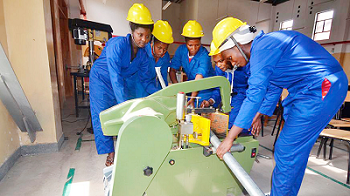Education is crucial in the acquisition of functional skills. For the individual, among other factors, knowledge, skills and competencies acquired through education are vital for effective labour market participation.
Linking the positive effect of human capital improvement through education to employability, scholars argued that education is critical in preparing individuals to enter the labour market, as well as equipping them with the skills to engage in lifelong learning experiences.
In addition to influencing employability, available literature also suggests that education also affects the sector of employment.
Thus, whether an individual will work in the formal or informal sectors is also partly determined by his education.
In addition to influencing employability, education is also identified as vital in the determination of work earnings.
The low quality of skills and skill mismatches in terms of quality and quantity have been linked with many factors.
Key issues
Several challenges confronting education and skills development in Ghana are identified.
Poor quality infrastructure and poorly motivated teachers are the first factors.
Many schools and training institutions lack modern equipment and tools, as well as good-quality classrooms, libraries and sanitation facilities to promote effective teaching and learning for the production of high-quality skills for the economy.
Teacher motivation is observed to be very low, hence affecting their commitment.
The second issue is about teacher supervision, particularly at the basic and secondary-school levels, which is very weak, and this has been cited as a major cause of teacher absenteeism in Ghana.
This harms teaching and learning, resulting in poor performance of students in recent times.
At the tertiary level, the proliferation of private universities, many of which lack quality teaching staff and infrastructure, brings to the fore the need for a quality accreditation process and more effective supervision.
The issue of poor linkage between skills training and industry is a major one, culminating in skills mismatch.
This is reflected in the development of training curricula with generally no input from industry, as well as a lack of opportunities for instructors to undertake periodic training in industries to be abreast with changes in the world of work.
This may largely explain the limited application of practical and case studies in teaching.
The emphasis on a supply-driven approach to skills development reflected in the overproduction of graduates in humanities and a limited number of graduates in science, engineering, technology and medicine, relative to the requirements of the labour market, is also an indication of poor linkage between skills training and skills requirements of the industry.
The fourth key issue focuses on the neglect and poor perception of vocational and technical training in the country.
Despite the renewed government focus on Technical and Vocational Education and Training (TVET) that led to the establishment of the Commission for Technical and Vocational Education and Training (COTVET), the sector continues to be plagued with a number of challenges.
These include conflict between the mandates and operations of the National Vocational Training Institute (NVTI) and COTVET, poor perception of TVET culminating in underfunding of the sector by the government, limited engagement of industry as a significant player in TVET and problems with quality assurance in the TVET system.
Recommendations
There is no question about the fact that the sure way for Ghana to experience economic transformation and be able to compete effectively in the global market is to increase the quantity and quality of its human capital base.
This requires a serious commitment from the government. Thus, putting Ghana on the path of economic transformation requires several policy actions and programmes to reverse the declining trend in the quality of skills of the labour force by addressing various challenges confronting the sector.
The following suggestions are outlined to stimulate debate to bridge the gap between industry and training/academic institutions:
* Measures that offer instructors opportunities to spend time periodically with relevant industry and sectors from the world of work, to stay in tune with new developments in the workplace.
* Commitment to the promotion of science, engineering and technology education to produce the skills required to enhance the growth and transformation of manufacturing as a major step toward the transformation of the Ghanaian economy.
* Considering the high cost of training in science, engineering and medical students, public universities funded by the government could concentrate on producing science, engineering and health graduates, while private universities with minimal resources focus on training students in the humanities.
* Provision of incentives, such as scholarships, training and motivation of science teachers and provision of science equipment at the secondary school level, to increase the supply of science-oriented students in secondary schools.
* Tighten the criteria for issuing accreditation to private tertiary institutions and monitor existing ones to ensure quality.
* Promotion of internships, seminars and fieldwork by education and training institutions to enhance links between training and the world of work.
* Raise teacher motivation with incentives such as salary enhancement, better pension packages and performance-based promotion rather than on the length of service.
* Increase investment in the provision of better school infrastructure, teaching aids, and other facilities to promote effective teaching and learning.
* Comprehensive review of the country’s education system, including duration and curricula, to make it relevant to the needs of the economy and to propel the country to embrace economic transformation.
The Writer is a PhD Candidate at the University of Ghana, Legon.
Email: kashiagbor@yahoo.com

